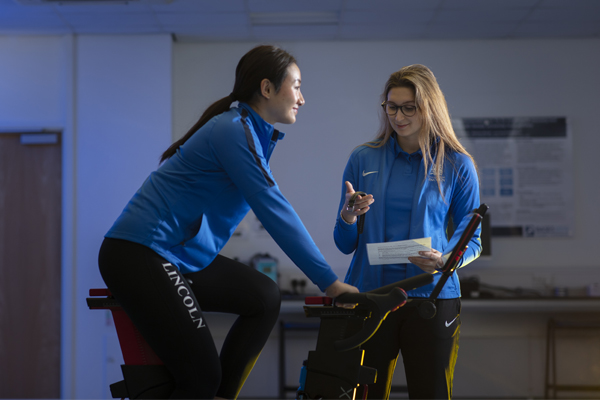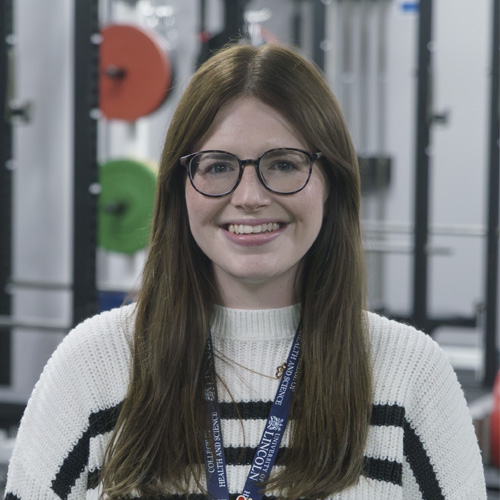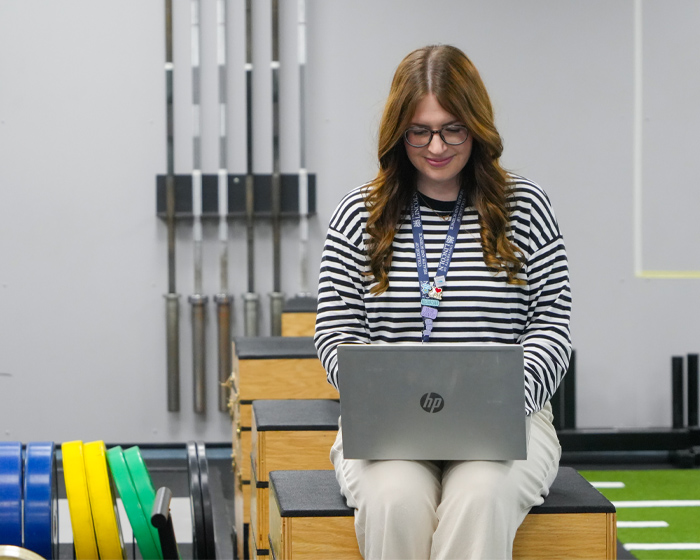Sport Science at Lincoln
Sport Science features a range of cutting-edge facilities and offers teaching that is underpinned by scientific research and scholarship, with links to industry and professional practices operating within the community.

/prod01/university-of-lincoln-cdn-pxl/media/responsive2017/research/newresearch/Georgia,Clay2,1600X600.jpg )
Older age is a common risk factor for a stroke and being physically active via physiotherapy and beyond has long been considered essential for effective rehabilitation. But unlike other promotion programmes for major health conditions, such as cardiac rehabilitation, older stroke patients do not have formalised opportunities to engage in physical activity post-stroke.
In her research, PhD student Georgia Clay is examining why this is the case, exploring the relationships between health, physical activity, stroke and exercise professionals, and older adult stroke survivors in the context of community stroke rehabilitation.
"Physical activity is seen as key for improving functional issues and physical health," explains Georgia, "but I've discovered that there has been limited focus towards older adults specifically. An unexpected finding has been the importance of the relationships that exist between professionals, stroke survivors, and their family or carers during rehabilitation. I aim to explore the nature of these relationships, which places focus on the interdependencies between individuals and society and how such relationships can influence personal experiences."
I'm hoping that the findings of my PhD will provide original insights and understanding about how individual actions and organisational practices can impact physical activity outcomes in community stroke rehabilitation.

Georgia Clay
PhD Student, School of Sport and Exercise Science
As part of her research, Georgia has been conducting interviews with professionals working in community stroke rehabilitation to support physical activity, and then with older adult stroke survivors. Several key themes are already emerging from the interviews, such as the importance and characteristics of professionals’ roles; collaborations between services, stroke survivors, and family members; and a focus on self-managed approaches.
Georgia has been presenting her findings at a number of major conferences, including the European Association for Sociology of Sport, and the European Stroke Organisation.
"Attending these kinds of conferences gives you a great opportunity to meet other students and researchers and gain feedback on your own work, in what is always a really supportive environment," says Georgia, who has also presented her research at other events, such as the Pint of Science festivals.
Sport Science features a range of cutting-edge facilities and offers teaching that is underpinned by scientific research and scholarship, with links to industry and professional practices operating within the community.

Georgia, who is based in the School of Sport and Exercise Science, completed her undergraduate degree at Lincoln in 2017 and was keen to return to the University start her PhD.
"I really wanted to get back to my research," says Georgia. "I contacted my former tutor here at Lincoln to see if there were any suitable projects taking place at the University and was lucky enough to find a research assistant post exploring areas related to psychological wellbeing."
Throughout her studies, Georgia says she has been helped by the supportive postgraduate environment at Lincoln. "My supervisory team has been great, and all the students pull together to help each other out, keeping in touch during particularly challenging times, such as Covid-19," explains Georgia, who is now in her final year of her PhD.
"I've taken part in lots of events and activities where students get together, discuss their research, and share ideas, such as writing retreats and our regular research seminars. I think that this is a really important part of the whole PhD process."
It's been an intense three and a half years to date, but I've really enjoyed my time at the University of Lincoln. There is a such a wide range of interesting research taking place here. I’m grateful for the opportunities I’ve had, and I have to say that my experience has been an extremely positive one.”

Georgia Clay
PhD Student, School of Sport and Exercise Science
As well as undertaking her PhD, Georgia is also working as a Lecturer at the University of Lincoln and has been teaching modules in health and exercise science and psychology-related areas of rehabilitation. And it is here that she sees her future calling.
"I'd love to stay in academia after completing my PhD," she says. "My aim is to continue to build a strong teaching and research portfolio and use my knowledge and experiences to promote good health and exercise education."

You can find out more about Georgia's research interests, work experience, and teaching responsibilities on her profile page.